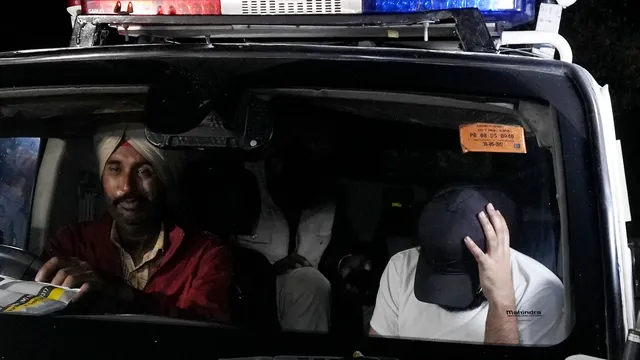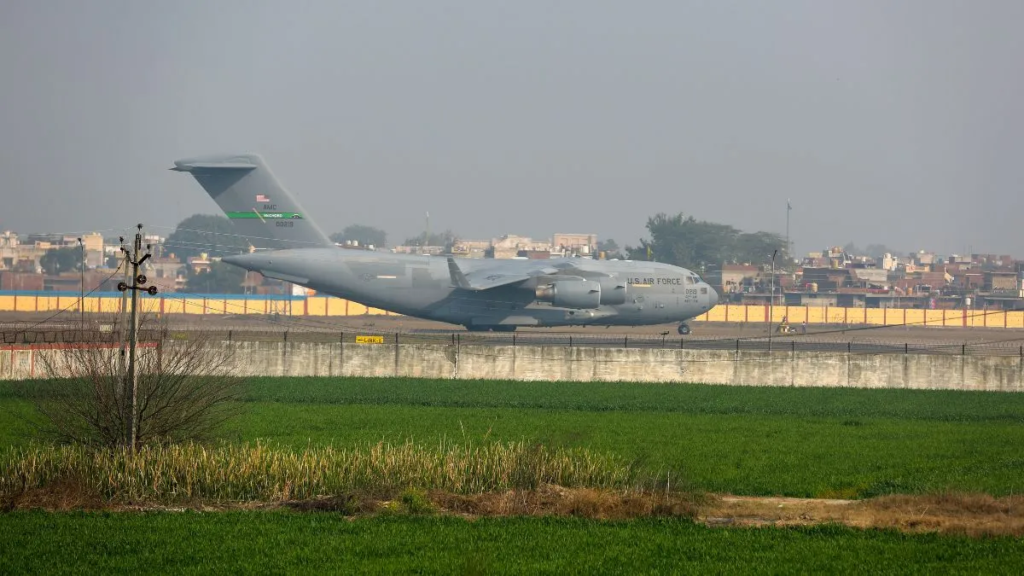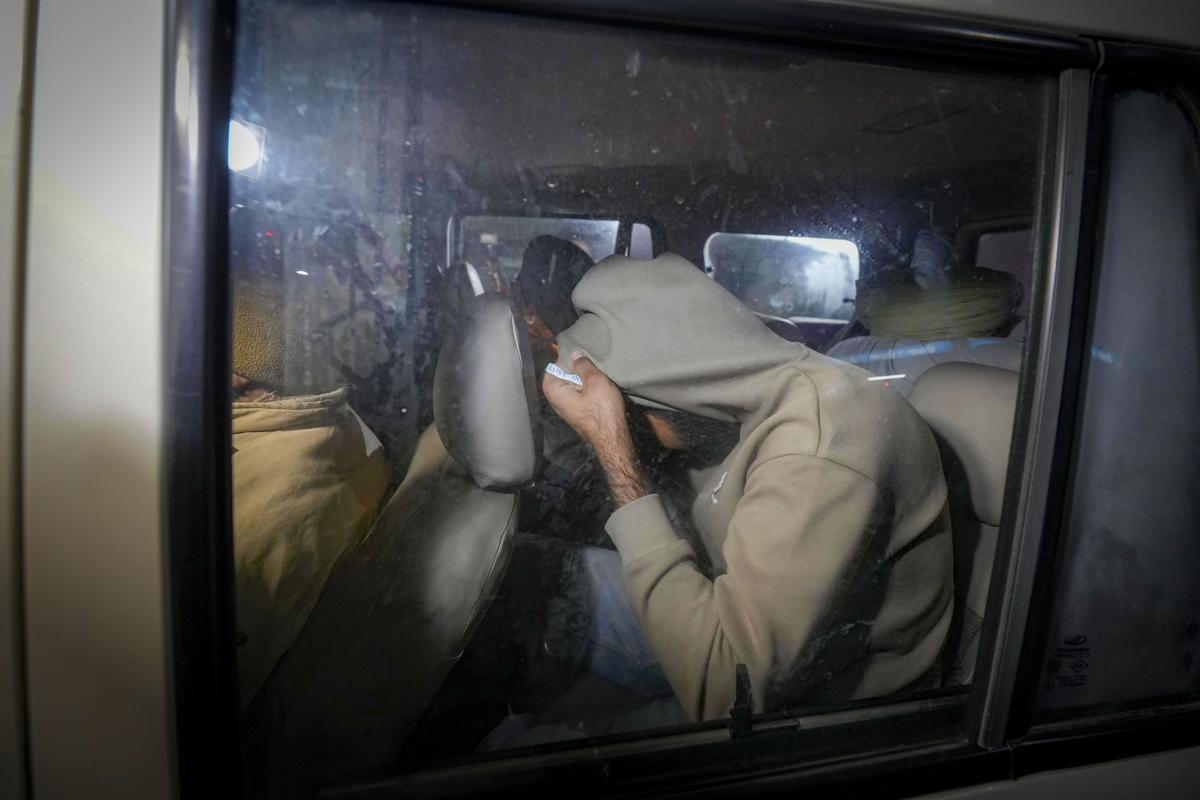A United States military plane carrying 119 Indian deportees landed in Amritsar on Saturday. Among the passengers, two individuals, identified as Sandeep and Pradeep, were immediately taken into custody by Punjab Police.
The duo, who are cousins, were wanted in connection with a murder case registered in Rajpura town of Punjab’s Patiala district in 2023. The arrest was a result of an ongoing investigation by the Patiala police, who had been tracking the accused and were prepared for their arrival.
The police confirmed that both individuals had already been declared proclaimed offenders and had been booked under multiple sections of the Indian Penal Code (IPC), including Section 302 (murder), Section 307 (attempt to murder), and other related charges.
However, despite their fugitive status, no ‘Look Out Circular’ had been issued against them, raising questions about the efficiency of law enforcement agencies in tracking absconding criminals who flee abroad.
Their deportation from the United States comes amid a broader crackdown by US authorities on illegal immigrants. This case highlights the implications of international law enforcement cooperation and the challenges that come with handling deportees who may have criminal records back in their home country.
The Arrest of Two Murder Accused and Its Implications
The arrest of Sandeep and Pradeep upon their arrival in Amritsar has drawn significant attention, both from legal experts and the general public.
The two had fled to the United States after allegedly being involved in a murder case in Rajpura in 2023. Their deportation from the US and immediate arrest in India demonstrate the growing international collaboration in dealing with fugitives who attempt to evade justice by crossing borders.
The case itself dates back to June 26, 2023, when a murder case was registered against the accused in Rajpura, Patiala. The charges included Sections 302 (murder), 307 (attempt to murder), 323 (voluntarily causing hurt), 506 (criminal intimidation), 148 (rioting, armed with a deadly weapon), and 149 (unlawful assembly) of the IPC.
Read : EL Salvador to Accept Deportees of Any Nationality: Rubio
Despite their proclaimed offender status, the lack of a Look Out Circular (LOC) has raised questions about the efficiency of tracking criminals who escape abroad.
Read : Germany to Tighten Rules on Deporting Foreigners Who Glorify Terror Acts Amid Gaza War
Law enforcement agencies often issue Look Out Circulars to alert immigration and airport authorities to prevent suspects from leaving or to ensure their detention upon arrival.
However, in this case, the absence of an LOC suggests lapses in coordination. This incident underscores the need for Indian authorities to strengthen legal frameworks to track and apprehend criminals who flee overseas.
The deportation and arrest also raise questions about the process through which fugitives are identified and deported. Many Indian nationals attempt to enter the United States illegally, often seeking asylum or better economic opportunities.
However, when individuals with pending criminal cases manage to leave the country undetected, it indicates a significant loophole in the system.
The US Immigration Crackdown and Its Impact on Indian Deportees
The deportation of Sandeep and Pradeep is part of a larger crackdown by the US government on illegal immigrants. In recent months, there has been an increase in the number of deportation flights carrying Indian nationals back to their home country. The plane that landed in Amritsar was the second such flight, carrying a total of 119 deportees.
Of the 119 deportees, 67 were from Punjab and 33 from Haryana, with the remaining individuals hailing from Gujarat, Uttar Pradesh, Goa, Maharashtra, Rajasthan, Himachal Pradesh, and Jammu and Kashmir.

This follows the first deportation flight on February 5, which carried 104 Indian deportees. These deportations come as part of broader immigration policies implemented by the US administration, particularly in response to concerns about illegal crossings at the US-Mexico border.
The increasing number of deportees highlights the growing risks faced by Indian nationals who attempt to enter the US illegally.
Many take perilous journeys through Latin America, paying exorbitant amounts to human smugglers in hopes of reaching American soil. However, the US authorities have tightened border security and have been actively deporting those caught without legal status.
For Punjab, which has long been a region with high emigration rates, this wave of deportations has significant social and economic implications. Many families invest substantial amounts of money to send their children abroad, often by illegal means. When these efforts fail, they return home not only facing financial ruin but also social stigma.
Punjab’s Response and Concerns Over Amritsar Being Used as a Deportation Hub
The increasing number of deportation flights landing in Amritsar has sparked concerns among Punjab’s political leadership. Punjab Chief Minister Bhagwant Mann expressed strong discontent over the city being used as a deportation hub.
He criticized the practice of landing deportation flights at Sri Guru Ramdas Airport in Amritsar, emphasizing that the city is a spiritual and cultural center known for the Golden Temple, Durgiana Mandir, Ram Tirath temple, Jallianwala Bagh, and Gobindgarh Fort.
During a press interaction, Mann questioned whether such deportation flights would be allowed to land in Vatican City if the deportees were from there. His comments reflect the broader sentiment among Punjab’s political and civil society members, who view the influx of deportation flights as a dent in the state’s global image.
While the government has been vocal about the need to protect Punjab’s reputation, the reality remains that many from the state continue to attempt illegal immigration despite the risks.
The state government, alongside law enforcement agencies, needs to address the root causes driving people to migrate illegally, including unemployment, economic instability, and lack of opportunities.
Moreover, deportation flights carrying criminals back to India highlight the need for stronger pre-departure scrutiny to prevent individuals with criminal records from leaving the country in the first place.

This case, in particular, serves as a reminder that law enforcement agencies must strengthen border control measures and improve international cooperation to prevent fugitives from escaping justice.
The arrest of Sandeep and Pradeep is just one instance where deportees returned home to face criminal charges. However, the broader issue of illegal immigration remains a challenge for both India and the United States.
While law enforcement agencies continue to track fugitives, the real solution lies in addressing the socio-economic factors that push people to risk their lives in pursuit of an uncertain future abroad.
The crackdown on illegal immigration by the US and the subsequent deportations will likely continue. For Punjab, this trend serves as a wake-up call to improve job opportunities and create awareness about the dangers of illegal migration.
Strengthening diplomatic ties and ensuring safer, legal migration pathways can help reduce the number of individuals who resort to dangerous and unlawful routes.
The case of Sandeep and Pradeep may be one among many, but it has undoubtedly brought attention to the complex web of illegal immigration, law enforcement cooperation, and the challenges of handling deported criminals.
Their arrest serves as a warning to others who believe they can evade justice by fleeing the country. As the Indian government works to streamline the deportation process, ensuring better tracking and coordination between international and domestic law enforcement agencies remains a key priority.

